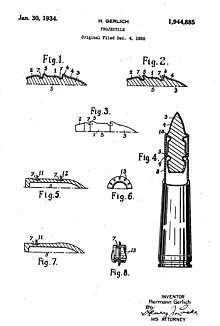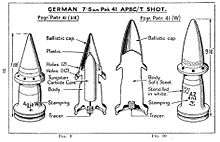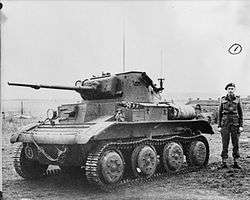Squeeze bore
A squeeze bore also known as a taper-bore, sometimes cone barrel or conical barrel is a weapon where the internal barrel diameter progressively decreases towards the muzzle resulting in a reduced diameter round with an increased velocity.
Mechanism


A squeeze bore utilizes the energy of the propellant to squeeze the diameter of the bullet or shell down, increasing penetration and velocity significantly. This process also meant high chamber pressure and low barrel service life.[2] For example, the service life of a squeeze bore 7.5 cm Pak 41 could be as low as 1000 rounds compared to 5000-7000 rounds for the 7.5 cm Pak 39 (L/48).[3] The diameter of a fired shell could decrease as much as 40% from .50 caliber to .30 caliber (M2 machine gun). Rather than squeezing solid shot, this is accomplished through a hardened penetrator core (tungsten for example) and a softer outer jacket (aluminium alloy) forming flanges or wings. This outer jacket was crushed as the projectile left the barrel.[4][5]
The squeeze bore concept typically was used in anti-tank guns before the widespread use of shaped charges.[4] Later, the perfection of discarding sabot ammo, which is based on the same concept of using a larger caliber barrel to fire a smaller caliber projectile at high-speed, negated the need for the squeeze bore concept.[2]
History and usage

The squeeze bore concept was first patented by German Karl Puff in 1903. Later, Hermann Gerlich in the 1920s and 1930s experimented with the concept resulting in an experimental 7mm anti-tank rifle with a 1,800 m/s muzzle velocity. This led to the squeeze bore concept sometimes being called the "Gerlich principle."
Between 1939-40, Mauser-Werk AG produced the 2.8 cm sPzB 41 and Krupp (in 1941) produced the 7.5 cm Pak 41. These were eventually discontinued due to the lack of tungsten and manufacturing complexity for the ammunition.[2][6][7]
Other uses of the squeeze bore include the British Littlejohn adaptor, a QF 6-pounder adapter and the M2 machine gun.[5] Squeezing down from 40mm to 30mm, 57mm to 42.6mm, and .50 caliber to .30 caliber respectively. The Littlejohn adapter was used to extend the service life of the QF 2 pounder and was designed by František Janeček whose anglicized name gave the Littlejohn its designation. The QF 6 pounder adapter was never adopted.
See also
References
- Gerlich, Hermann. "Projectile" (PDF). www.freepatentsonline.com. Free Patents Online. Retrieved 18 July 2018.
- McCollum, Ian (18 February 2017). "Q&A #9: Gas Impingement, Reading List, Squeeze-Bores, and More!". Forgotten Weapons. Youtube. Retrieved 8 July 2018.
- Ankerstjerne, Christian. "Anti-tank Ammunition Types". panzerworld.com.
- McCollum, Ian (24 April 2018). "Q&A #17: Bullpups, Stocked Pistols, Delayed Blowback, and More!". Forgotten Weapons. Youtube. Retrieved 6 July 2018.
- "Exotic Barrels Part 1: Squeeze Bores | WeaponsMan". weaponsman.com. WeaponsMan. Retrieved 6 July 2018.
- "Squeeze Bore". Shooting with Hobie. 12 January 2011. Retrieved 8 July 2018.
- S, Rusty (20 May 2016). "Mauser's high-tech antitank gun: the 2.8cm sPzB 41 - The Firearm Blog". The Firearm Blog. Retrieved 8 July 2018.